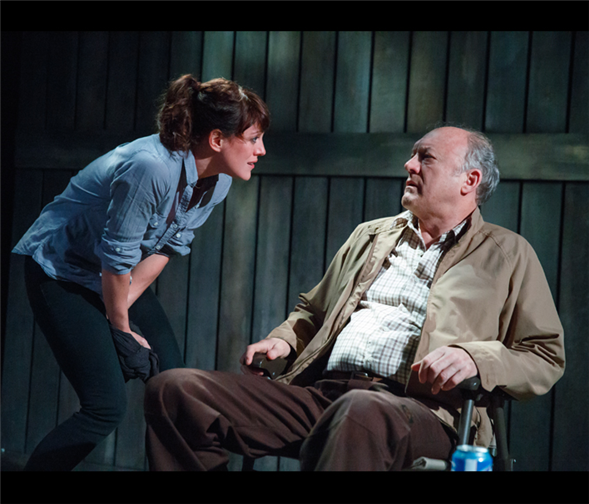The Other Thing is never the play you expect
---
It seems so innocent at first. Just three folks outside a barn in rural Virginia. Over in the folding chairs, Kim, a reporter, interviews Carl about his work as a professional ghost hunter, and in the background, Carl's son Brady sets up equipment to test whether the barn is haunted. Clearly, this is going to be a quirky, slice-of-life show full of gentle good times.
Or maybe not. Because here's the deal with
The Other Thing, the new play by Emily Schwend that's now running in Second Stage's Uptown series at the McGinn/Cazale Theatre – it's never what we expect it to be.
By the end of the first act, we realize that supernatural forces are not hypothetical in this show. They're terrifyingly real, and they've got their spectral hooks in everyone we see. And by the end of the
second act, we understand that Schwend is using these ghosts and demons to inject new blood (ahem) into an old cultural debate. It turns out that
The Other Thing is a chatty relationship drama, a spooky thriller,
and a provocative play of ideas. All at once.
So how do you stage a script this complex? For director Lucie Tiberghien, the answer lies in not worrying too much about genres.
That's clear in her approach to the political arguments. "I was trying to tell a story of four individuals and their relationships, and out of that all of the political thinking just kind of emerged," the director says. "I mean, I knew it was there because that's what was appealing to me about the script when I first read it. But I also felt that it didn't need much 'exposing.' What I thought was essential was trying to understand [Kim] as a human being and as a woman in this world, in these relationships. That's what I thought would allow the political message to come forth."
Tiberghien especially looked to Schwend's idiosyncratic language to help her understand the characters as people. "Emily's writing is incredibly specific," she says. "Her punctuation and the wording of every sentence is somewhat unusual. It's very specific to these characters, and if you follow it with great discipline, you understand so much about who these people are."
Take Carl, who plays up his folksiness to mask his darker, angrier thoughts. "The way Carl talks is very striking," Tiberghien says. "It's 'Well. Period. So. Comma. If there are any disturbances. Period.' If you just do what's on the page, his whole personality emerges."
Similarly, the director has to trust what's been written, even when there's little going on. As she explains, "Act one is basically one long beat. It's a slow-burning scene, and a lot of [our work] had to do with not getting in the way of that. Because in a lot of contemporary writing, it's all about the event. What's creating the event? What do you want? It's very action driven.
"But in this case, they aren't pursuing anything very actively for a long time except having a conversation. These relationships are evolving at a very slow pace. I didn't want to manufacture micro-events here and there – little moments of conflict where really the conflict is not there yet, or at least not on the surface at all. Things need to happen slowly in this play, so that we can really observe and understand them."
---
Mark Blankenship is the editor of TDF Stages
Photos by Joan Marcus. Top photo: Samantha Soule as Kim and John Doman as Carl.
